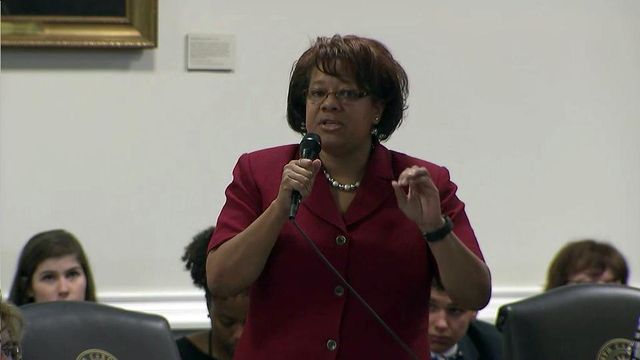Senate tentatively approves two tracks for high school math
After more than an hour of sometimes heated debate Wednesday, the Senate gave preliminary approval to a proposal to require public high schools to offer both a "traditional" math curriculum and an "integrated" course of study.
Posted — UpdatedThe chamber followed up the 33-15 vote with a cursory voice vote for final approval, but Sen. Tom Apodaca, R-Henderson, later brought the measure back for reconsideration. He said one of the amendments to the bill was flawed and needed to be corrected before a final vote Thursday.
Apodaca earlier was involved in an acrimonious back-and-forth with Sen. Jerry Tillman, R-Randolph, the sponsor of House Bill 657.
The bill would give students and their parents the choice of following a math sequence of Algebra I to Geometry to Algebra II or the Math I, Math II and Math III courses that are remnants of the state's adoption of Common Core, a national set of teaching standards that lawmakers abandoned two years ago.
"This is just getting ridiculous," Apodaca said. "We ought to trash the whole system and go back 10 years."
Rather than focusing on high school, he said, the state should fix math issues in elementary school "where we're doing true damage to children with the methods we are teaching them math."
"If you don't like choice and you want to be stuck with the June Atkinson/Bill Cobey Common Core, that's exactly what you're going to get," Tillman shot back, referring to the state education superintendent and the chairman of the State Board of Education.
Teachers say the integrated math concepts are too challenging for some students, Tillman said, so they want to have the option of teaching the sequence of courses generations of high school students went through.
A number of Democrats said offering dual math tracks would be challenging for small schools with small faculty, finding qualified math teachers would be harder if they had to pick up a larger class load to accommodate different curricula and students would be locked into a sequence from their freshman year and wouldn't be able to change later if their interests changed.
"The math just doesn't work," said Sen. Floyd McKissick, D-Durham.
Tillman said he was committed to finding the money small schools would need to make the system work.
Sen. Erica Smith-Ingram, D-Northampton, who teaches math in Virginia, said the integrated courses help students master the concepts that colleges and employers demand. Yet, she said, she recognizes that it's not for everyone.
"We have to meet our students where they are," Smith-Ingram said. "We have to provide them with an alternative route with traditional sequencing."
Apodaca said her argument was so persuasive that he decided to vote for the measure.
School districts have two years to prepare for the change, and Smith-Ingram said lawmakers need to be prepared to provide them with the financial and professional development support needed to ensure students succeed in whichever course of study they pursue.
Related Topics
• Credits
Copyright 2024 by Capitol Broadcasting Company. All rights reserved. This material may not be published, broadcast, rewritten or redistributed.






